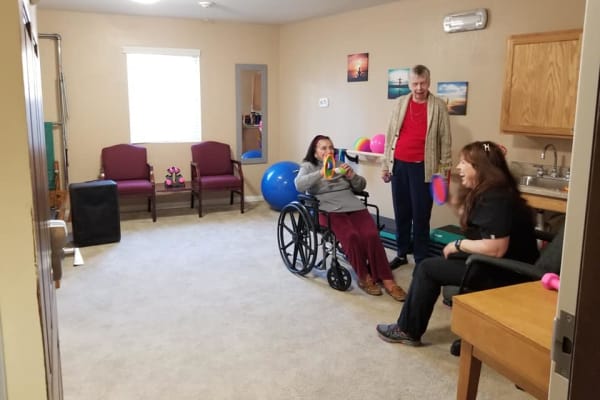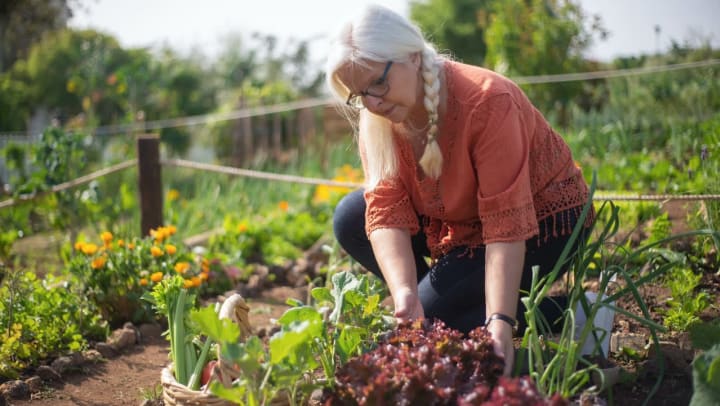Gardening For Seniors
Looking for a new hobby can be a challenge. If you’re in this boat, then perhaps you don’t need to look any further than outside your yard! Gardening is a great way to reconnect with your surroundings, foster an appreciation of the earth, and get your mind and body moving.
This article will introduce the many benefits of gardening for seniors as well as share some fun gardening ideas to get you started!
Benefits of Gardening For Seniors
There are numerous benefits of gardening for seniors, including mental health benefits, as well as physical health benefits you may not realize! Here are some of the best gardening benefits for seniors.
-
Light Exercise - Pulling weeds, tilling soil, carrying seeds and bags of fertilizer back and forth are all forms of light exercise that are inherent in the gardening process. In addition, some of the movements involved in gardening can help strengthen muscles and improve flexibility. Gardening is a great way to get a light workout in without even realizing it.
-
Lowers Blood Pressure - Since gardening is a great form of light exercise that can help get your heart pumping and blood flowing, it can also help lower blood pressure. According to the CDC, just 30 minutes of exercise each day can help seniors avoid common aging-related health problems, like high blood pressure. Gardening is a great way to hit this target and stay healthy.
-
Can Help Decrease Risk of Dementia - Gardening is a sensory stimulating experience - you see the colors and smell the aromas of the flowers, leaves, or vegetables. You can feel the soil and other textures involved in the process. You can hear the world around you and reconnect with the earth. This sensory stimulation has a connection with decreasing the risk of dementia. In fact, one study found that daily gardening has the “potential to reduce the likelihood of dementia by up to 36%.”
-
Helps Fight Depression - Fresh air is a cure-all, in and of itself. Gardening is a great way to get out in the fresh air, take in Vitamin D from the sun, and also boost serotonin (happiness chemicals) in your brain, which can help improve mood and also fight depression.
-
Strengthens Bones & Joints - Time spent outdoors in the sun gardening provides another health benefit for seniors - healthier bones and joints! The Vitamin D that the sun provides plays an important role in protecting and strengthening bones. Vitamin D helps your body absorb calcium, which supports good bone and joint health.
Safe Gardening Tips
Interested in getting started with gardening? Make sure you stay safe with these safe gardening tips for seniors.
-
Stay Hydrated - Being out in the sun, especially if it’s something you’re not used to, can easily lead to dehydration and fatigue. If you’re starting a garden, be sure to increase hydration levels on days you know you’ll be heading outside, and bring a bottle of water with you.
-
Start Early - You can also decrease odds of dehydration and fatigue by making sure you’re not out in the sun during peak hours of the day. Consider starting your day with gardening and heading out early, especially if you live in a place with extremely high temperatures, like Las Vegas.
-
Check Weather - Always check the weather report before heading outside for extended periods of gardening. This will reduce your chances of overheating, being outside with a high UV index, and also avoiding potential storms or high winds that could be dangerous.
-
Mindful of Power Tools - Power tools can be helpful for gardening, but they also can create added potential danger. Make sure you are highly alert when using power tools while gardening, and always unplug or remove batteries when not in use to avoid accidents. You can also look into specific garden tools for elderly to minimize tool-related dangers.
-
Treat Cuts and Bites - Working in a garden can naturally give rise to small cuts, cracked skin, and bug bites. Stay on top of any gardening-related injuries, no matter how small they might be, to avoid infection. This is especially important for elderly gardening. Make it a habit to clean, treat, and bandage after all your gardening sessions.
Gardening Ideas For Seniors
When it comes to gardening, there are so many options for what you can plant and where you can plant it. Certain types of gardens will be better suited for seniors who are getting started with gardening, including those who reside in assisted living or seniors living with space limitations.
-
Vertical Gardens - Vertical gardens are a great option for seniors gardening since it raises your working space to a more accessible height. If you have knee problems, or struggle to get down close to the ground, consider starting a vertical garden.
-
Raised Beds - Raised beds can be a great gardening tool for seniors, since they are more accessible for seniors who may have physical restrictions that prevent them from bending or stooping over.
-
Windowsill Gardening- Windowsill gardens are also a good option for seniors, especially if you just want to get started with a few plants or flowers.
-
Patio Gardens - Patio gardens are a highly accessible gardening option; instead of heading outdoors into inclement weather, seniors just have to take a trip out to their back or front patio.
-
Indoor Gardening- Even though there are many health benefits for seniors associated with fresh air and sunlight, gardening doesn't have to be an outdoor practice. Getting a few indoor potted plants or starting indoor gardening is a good option for seniors as well.
Gardening Activities at Ridgeline
At Ridgeline, we offer a number of gardening activities and other wellness programs for our senior and elderly residents. If you’re interested in learning more about your local Ridgeline community and the gardening activities we offer, contact the community to learn more today.


